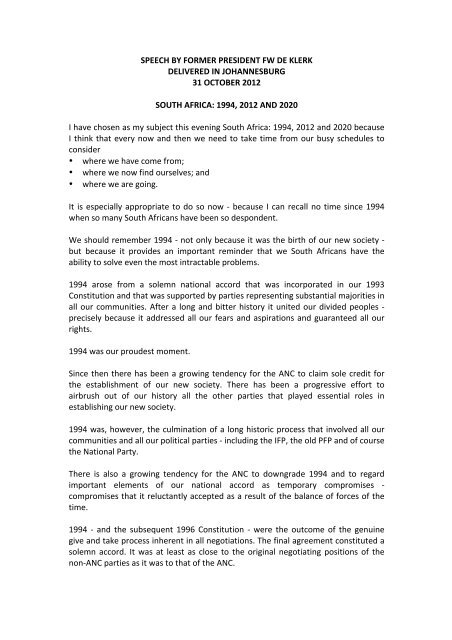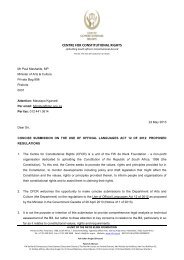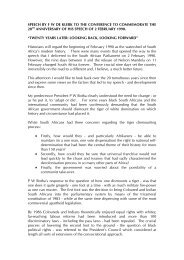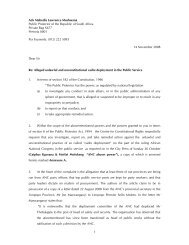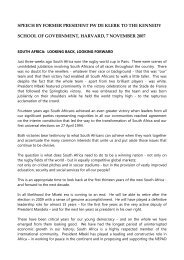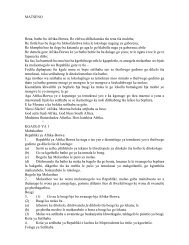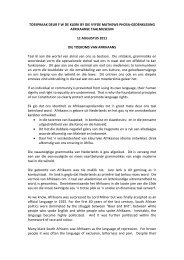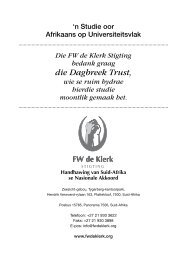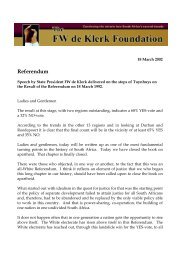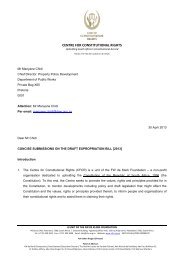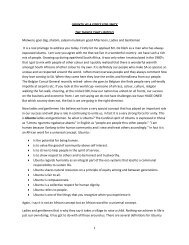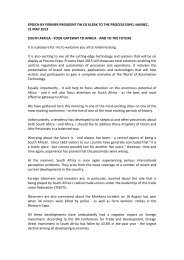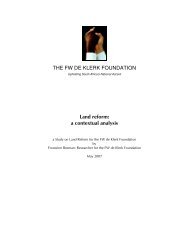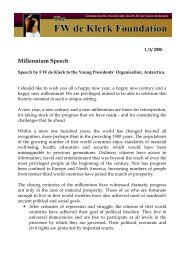speech - FW de Klerk Foundation
speech - FW de Klerk Foundation
speech - FW de Klerk Foundation
Create successful ePaper yourself
Turn your PDF publications into a flip-book with our unique Google optimized e-Paper software.
SPEECH BY FORMER PRESIDENT <strong>FW</strong> DE KLERK<br />
DELIVERED IN JOHANNESBURG<br />
31 OCTOBER 2012<br />
SOUTH AFRICA: 1994, 2012 AND 2020<br />
I have chosen as my subject this evening South Africa: 1994, 2012 and 2020 because<br />
I think that every now and then we need to take time from our busy schedules to<br />
consi<strong>de</strong>r<br />
• where we have come from;<br />
• where we now find ourselves; and<br />
• where we are going.<br />
It is especially appropriate to do so now -‐ because I can recall no time since 1994<br />
when so many South Africans have been so <strong>de</strong>spon<strong>de</strong>nt.<br />
We should remember 1994 -‐ not only because it was the birth of our new society -‐<br />
but because it provi<strong>de</strong>s an important remin<strong>de</strong>r that we South Africans have the<br />
ability to solve even the most intractable problems.<br />
1994 arose from a solemn national accord that was incorporated in our 1993<br />
Constitution and that was supported by parties representing substantial majorities in<br />
all our communities. After a long and bitter history it united our divi<strong>de</strong>d peoples -‐<br />
precisely because it addressed all our fears and aspirations and guaranteed all our<br />
rights.<br />
1994 was our prou<strong>de</strong>st moment.<br />
Since then there has been a growing ten<strong>de</strong>ncy for the ANC to claim sole credit for<br />
the establishment of our new society. There has been a progressive effort to<br />
airbrush out of our history all the other parties that played essential roles in<br />
establishing our new society.<br />
1994 was, however, the culmination of a long historic process that involved all our<br />
communities and all our political parties -‐ including the IFP, the old PFP and of course<br />
the National Party.<br />
There is also a growing ten<strong>de</strong>ncy for the ANC to downgra<strong>de</strong> 1994 and to regard<br />
important elements of our national accord as temporary compromises -‐<br />
compromises that it reluctantly accepted as a result of the balance of forces of the<br />
time.<br />
1994 -‐ and the subsequent 1996 Constitution -‐ were the outcome of the genuine<br />
give and take process inherent in all negotiations. The final agreement constituted a<br />
solemn accord. It was at least as close to the original negotiating positions of the<br />
non-‐ANC parties as it was to that of the ANC.
2<br />
It contains all the basic rights that South Africa needs to maintain a free and<br />
prosperous society.<br />
• It articulates the values of human dignity, equality, fundamental rights and non-‐<br />
discrimination on which the new South Africa has been established.<br />
• It acknowledges the supremacy of the Constitution and the rule of law.<br />
• It makes provision for all the institutions and mechanisms that are necessary for<br />
multiparty <strong>de</strong>mocracy based on accountability, openness and responsiveness.<br />
It has served us well for the past 18 years.<br />
Which brings me to 2012.<br />
It is important to remember the many, many successes that we have achieved since<br />
1994 -‐ many of them as a result of government action:<br />
• We have experienced 18 years of economic growth -‐ interrupted only briefly by<br />
the global economic crisis of 2008.<br />
• We have shown that we can compete with the best in the world, particularly in<br />
banking and financial services. And in sport as well!<br />
• We have also ma<strong>de</strong> significant social progress:<br />
o The percentage of the population living in absolute poverty has <strong>de</strong>clined<br />
from 31% in 1995, to 23% in 2008 -‐ largely because of social grants.<br />
o 94% of households now have access to drinkable water;<br />
o more than three million housing units have been built -‐ enough to house<br />
almost a quarter of the population -‐ with another million units in the<br />
pipeline;<br />
o three quarters of the population now have access to electricity and<br />
sanitation compared with only half in 1994;<br />
• We have experienced moments -‐ like the 2010 Soccer World Cup -‐ when we have<br />
lived up to Archbishop Tutu’s characterization of us as the Rainbow Nation of<br />
God.<br />
Nor would it be fair to blame all our present problems solely on the Government.<br />
The reality is that it has had to contend with enormous socio-‐economic backlogs<br />
inherited from the past.<br />
According to a recent World Bank study, the future prospects of our children are still<br />
<strong>de</strong>termined by race and gen<strong>de</strong>r; by the status and education level of their parents;<br />
and by whether they live in urban townships or rural areas.<br />
Neither would it be fair to blame all the problems that we are now experiencing on<br />
the past.<br />
After 18 years in government, the ANC must accept primary responsibility for our<br />
current situation. One can hardly disagree with the diagnosis of the National<br />
Planning Commission regarding the roots of the crisis. They inclu<strong>de</strong>:
• high unemployment;<br />
• poor education -‐ especially for black South Africans;<br />
• poor public service <strong>de</strong>livery;<br />
• corruption; and<br />
• the fact that South Africa is still a divi<strong>de</strong>d society.<br />
3<br />
There is, however, another un<strong>de</strong>rlying cause behind all these factors: it is the<br />
Alliance’s adherence to unconstitutional and fundamentally inappropriate<br />
i<strong>de</strong>ologies.<br />
In terms of the ANC’s National Democratic Revolution i<strong>de</strong>ology, 1994 was not the<br />
end of the revolutionary process -‐ but merely an important beachhead on the line of<br />
march toward the establishment of, what it calls, a non-‐racial <strong>de</strong>mocratic society.<br />
This revolution continues un<strong>de</strong>r the aegis of the ANC government and appears to be<br />
directed against the majority of white South Africans -‐ whom the ANC still regards as<br />
“antagonists”.<br />
The goal of the NDR is in essence to redistribute property and jobs so that they<br />
reflect the <strong>de</strong>mographics of the country at all levels in the private and public sectors<br />
-‐ irrespective of what the Constitution dictates. This would involve an enormous<br />
process of social engineering in which people’s prospects would once again be<br />
<strong>de</strong>termined by race, rather than by individual merit and circumstances.<br />
In accordance with the NDR, the ANC has unconstitutionally attempted to seize what<br />
it calls the levers of state power -‐ including the public service, the security forces,<br />
parastatals, the judiciary and the SABC. It is also committed to staffing these<br />
institutions with its own cadres, often irrespective of merit or experience.<br />
The NDR was the source of the radical policy proposals that were adopted by the<br />
ANC at its Policy Conference in June and that will be presented to the National<br />
Conference in December.<br />
At the core of these proposals is the ANC’s belief that the balance of forces has<br />
shifted sufficiently in South Africa and internationally for it to abandon the<br />
compromises it ma<strong>de</strong> in 1994. According to Presi<strong>de</strong>nt Zuma, “We had to make<br />
certain compromises in the national interest... For example, we had to be cautious<br />
about restructuring the economy, in or<strong>de</strong>r to maintain economic stability and<br />
confi<strong>de</strong>nce at the time.”<br />
The ANC has evi<strong>de</strong>ntly -‐ and quite incorrectly -‐ conclu<strong>de</strong>d that such caution is no<br />
longer necessary.<br />
Its policy proposals inclu<strong>de</strong>:<br />
• the establishment of a “<strong>de</strong>velopmental state” which would be “capable of<br />
intervening effectively to transform economic relations, at the centre of our<br />
economic agenda.”<br />
• Reassessment of the future of the provinces;
4<br />
• “state ownership, including more strategic use of existing state-‐owned<br />
companies, as well as strategic nationalization, where <strong>de</strong>emed appropriate on<br />
the balance of evi<strong>de</strong>nce”;<br />
• greater state involvement in mining, falling short of outright nationalization;<br />
• the utilization by government of the assets of insurance and pension funds for<br />
state <strong>de</strong>velopmental projects; and<br />
• accelerated land reform that<br />
o “must represent a radical and rapid break from the past, without<br />
significantly disrupting agricultural production and food security”;<br />
o would abandon the principle of “willing buyer, willing seller”;<br />
o would down-‐gra<strong>de</strong> private property rights to freehold “with limited<br />
extent”; and that would<br />
o prohibit foreigners “as a principle” from owning land.<br />
The other i<strong>de</strong>ology that has contributed to the present crisis is the Marxism-‐Leninism<br />
of the SACP and Cosatu. It is one of the main causes of unemployment and of our<br />
failure to attract the foreign investment that we need for sustained economic<br />
growth:<br />
• South Africa has the worst labour relations in the world. According to the World<br />
Economic Forum’s Global Competitiveness Report it is the worst of 144 countries<br />
assessed in terms of co-‐operation in labour-‐employer relations;<br />
• Cosatu has continuously raised labour costs without commensurate productivity<br />
increases -‐ which has inevitably resulted in job losses. South Africa’s flexibility of<br />
wage <strong>de</strong>termination is the fourth worst in the world.<br />
• Our labour legislation is amongst the most onerous anywhere. South Africa’s<br />
hiring and firing practices are the second worst in the world.<br />
• Cosatu’s campaign to abolish labour brokers would lead to the loss of more than<br />
half a million jobs.<br />
• Cosatu has steadfastly opposed proposals to open labour markets to the<br />
unemployed -‐ including proposals at the ANC’s 2005 National General Council for<br />
a two-‐tier labour system and more recent proposals for a youth employment<br />
subsidy.<br />
• It is <strong>de</strong>stroying jobs by alienating foreign and domestic investors through its<br />
confrontational stance and open support for nationalisation.<br />
On top of all this came the Marikana massacre of 16 August; the subsequent wave of<br />
violent and uncontrolled wildcat strikes; and hopelessly unrealistic wage <strong>de</strong>mands.<br />
The Farlam Commission will no doubt inform us in January of all the circumstances<br />
relating to the inci<strong>de</strong>nt. However, enough information has already been ma<strong>de</strong><br />
available to raise the most serious possible questions regarding the behaviour of the<br />
police.<br />
All this has negative implications for present and future foreign investment.<br />
According to the UN Conference for Tra<strong>de</strong> and Development, foreign direct<br />
investment in South Africa has fallen by 43.6% in the past year -‐ the largest <strong>de</strong>cline<br />
among all <strong>de</strong>veloping economies. South Africa is <strong>de</strong>pen<strong>de</strong>nt on foreign investment,<br />
not only for growth, but also to cover our large current account <strong>de</strong>ficit.
5<br />
On 27 September Moody’s downgra<strong>de</strong>d South Africa’s sovereign credit rating from<br />
A3 to Baa1. Moody’s referred to policy uncertainty ahead of the ANC National<br />
Conference in December and noted that, “The revision reflects Moody’s view of the<br />
South African authorities’ reduced capacity to handle the current political and<br />
economic situation and to implement effective strategies that could place the<br />
economy on a path to faster and more inclusive growth.”<br />
This, unfortunately, is where we find ourselves at the end of October 2012.<br />
A rising ti<strong>de</strong> of corruption, ineptitu<strong>de</strong>, cadre <strong>de</strong>ployment and inappropriate i<strong>de</strong>ology<br />
has inundated much of the state sector and is threatening economic growth and<br />
jobs.<br />
• Most of our schools have been drowned by this ti<strong>de</strong> of dysfunctionality -‐ leaving<br />
millions of failed school children floun<strong>de</strong>ring, out of their <strong>de</strong>pth and with little or<br />
no chance of reaching the shore.<br />
• Eskom, the SABC and South African Airways have been engulfed by<br />
mismanagement and incompetence.<br />
• Black Economic Empowerment is used to enrich a small politically-‐connected<br />
elite rather than to promote real equality;<br />
• Billions of rands are channeled to poorly qualified ten<strong>de</strong>rpreneurs;<br />
• Government <strong>de</strong>partment after government <strong>de</strong>partment, municipality after<br />
municipality and parastatal after parastatal fail to achieve acceptable audits;<br />
• The rising ti<strong>de</strong> is lapping at the foundations of those <strong>de</strong>partments and<br />
municipalities that continue to function. Throughout the sector some embattled<br />
public servants are attempting to stem the flood by shoring up dykes and<br />
building coffer dams. But they have an increasingly impossible task.<br />
Substantial areas of high ground continue to stand proud above the <strong>de</strong>luge. They<br />
inclu<strong>de</strong> the Treasury, the Supreme Court of Appeal, the Constitutional Court, the<br />
Public Protector, the Western Cape and the City of Cape Town. They also inclu<strong>de</strong><br />
great swathes of the private sector, our banks, our farmers, our mines and service<br />
industries that continue to perform with excellence.<br />
Ironically, and perhaps predictably, these are the very institutions that would be<br />
targeted by the ANC’s all-‐encompassing <strong>de</strong>velopmental state.<br />
Everyone -‐ except the Government -‐ agrees that we are facing the most critical<br />
challenges since 1994. Thabo Mbeki, Fikile Mbalula, Russel Loubser, Mamphela<br />
Ramphele, and many others have all raised their voices in alarm.<br />
Which brings us to the road to 2020.<br />
The progress we make along that road will be <strong>de</strong>termined by a number of factors<br />
including<br />
• the <strong>de</strong>cisions that the ANC will take at its National Conference in December;
6<br />
• the Government’s ability to <strong>de</strong>al with the current wave of lawless protest and<br />
wildcat strikes;<br />
• its ability to address the critical challenges of education and unemployment;<br />
• our ability to uphold the Constitution; and<br />
• the ability of opposition parties to mount a credible electoral threat to the ANC.<br />
Recently Clem Sunter downgra<strong>de</strong>d his future scenario for South Africa from a 50%<br />
chance that we will break through to first world success; a 40% chance that we will<br />
continue our present gradual <strong>de</strong>cline and a 10% possibility that we will become a<br />
failed state. He still believes that there is 50% chance of success -‐ but there is now a<br />
25% chance that we will become a failed state.<br />
I don’t want to attach percentages to the high road, downhill road and precipice<br />
scenarios. I would, however, like to set out my views regarding the factors that will<br />
lead to these three <strong>de</strong>stinations.<br />
One of the routes to the high road lies through the implementation of the sensible<br />
and balanced policies set out in the National Development Plan. It would also require<br />
the Alliance to jettison its NDR and Marxist-‐Leninist i<strong>de</strong>ologies for once and for all<br />
and to work instead for the achievement of the vision set out in our Constitution.<br />
Another route to the high road lies in the ability of opposition parties to form a<br />
broad electoral front that will be able to mount a credible challenge in the 2014 and<br />
2019 elections. I have long supported such a <strong>de</strong>velopment and enthusiastically<br />
welcome the initiative that Helen Zille has launched in this regard.<br />
A third route to the high road might arise from a split between the increasingly<br />
fractious factions that make up the ANC Alliance. It is difficult to see how social<br />
<strong>de</strong>mocrats, communists, African nationalists and black capitalists will be able to<br />
remain un<strong>de</strong>r the same political umbrella forever.<br />
Maintenance of our present downward trajectory would require the ANC to revert to<br />
the “First Phase” policies that it has implemented during the past 18 years. This<br />
should not be impossible since the ANC accepts that progress with the National<br />
Democratic Revolution is <strong>de</strong>pen<strong>de</strong>nt on the prevailing “balance of forces” permit.<br />
All the signals now indicate unambiguously that the balance of forces is not<br />
propitious for the ANC to embark on its proposed “second phase” of the revolution.<br />
However, even if it wishes to maintain the present downward trajectory, the ANC<br />
will have to take effective steps to restore national and international investor<br />
confi<strong>de</strong>nce. It will also have to do whatever is necessary to establish some <strong>de</strong>gree of<br />
or<strong>de</strong>r and predictability in the labour market.<br />
Finally, the route to the precipice has already been clearly sign-‐posted by the ANC’s<br />
policy conference and by the recent congresses of Cosatu and the SACP. All the ANC<br />
has to do to reach the edge of the abyss is to implement those policies and to
7<br />
continue to give its primary loyalty to the National Democratic Revolution rather<br />
than to the Constitution.<br />
This is what the precipice scenario would look like:<br />
• South Africa would not only fail to attract the foreign investment it requires to<br />
promote economic growth the to create jobs -‐ it would run the risk of serious<br />
foreign disinvestment from key industries;<br />
• The country would experience a serious balance of payments crisis;<br />
• The value of the rand would <strong>de</strong>cline significantly;<br />
• Unemployment would increase;<br />
• Race relations would <strong>de</strong>teriorate;<br />
• The economy would go into recession;<br />
• Government revenue would fall and service protests would increase; and<br />
• Enormous strains would be put on the 1994 consensus on which our non-‐racial<br />
constitutional <strong>de</strong>mocracy has been built.<br />
However, I don’t want to leave you with a sense of <strong>de</strong>spon<strong>de</strong>ncy.<br />
For centuries visitors to our country have generally conclu<strong>de</strong>d that “it is a lovely<br />
place -‐ but cannot possibly last for another five years.” And yet we are still here. As<br />
1994 proved, we South Africans have a won<strong>de</strong>rful ability to overcome even the most<br />
daunting challenges.<br />
There is also a great <strong>de</strong>al on the positive si<strong>de</strong>. Firstly, there is our Constitution. To the<br />
immense frustration of some ANC lea<strong>de</strong>rs, it did not <strong>de</strong>volve absolute power on<br />
parliament and on the executive. It provi<strong>de</strong>d them with all the powers they nee<strong>de</strong>d<br />
to rule -‐ but required them to do so within the reasonable constraints established by<br />
the Constitution and the bill of rights. This means that<br />
• power is dispersed throughout society;<br />
• unconstitutional laws and conduct can be checked by an in<strong>de</strong>pen<strong>de</strong>nt judiciary;<br />
• ordinary citizens can promote their legitimate objectives through civil society<br />
organizations; and that<br />
• they can appeal to Chapter 9 institutions to <strong>de</strong>fend their rights.<br />
Our second advantage is that South Africans who support the Constitution are now<br />
fully in step with the best elements in the international community. Any government<br />
action that <strong>de</strong>viates too significantly from international norms of <strong>de</strong>mocratic and<br />
economic governance will be severely punished by markets and international<br />
opinion.<br />
Thirdly, no mo<strong>de</strong>rn state can successfully govern against the will of substantial<br />
minorities. There is no way that government will be able to achieve important<br />
national goals if it alienates significant minorities and interest groups.<br />
Fourthly, those who support pragmatic constitutional and economic approaches<br />
have an enormous advantage on what the ANC calls ‘the battlefield of i<strong>de</strong>as’.
8<br />
I<strong>de</strong>ological approaches -‐ like apartheid, the NDR and communism -‐ simply do not<br />
work.<br />
Finally, support for the Constitution is no longer a black/white thing. Black<br />
politicians, journalists, businessmen and religious lea<strong>de</strong>rs are in the vanguard of<br />
those who support the Constitution. They know that it is the best guarantee for the<br />
continuation of freedom, reconciliation and national unity -‐ and they also know that<br />
it advocates transformation.<br />
I am confi<strong>de</strong>nt that we will achieve the high road provi<strong>de</strong>d we can work together as<br />
South Africans to achieve the vision in our Constitution: it is a vision of human<br />
dignity, equality and enjoyment of human rights and freedoms for all our people.


